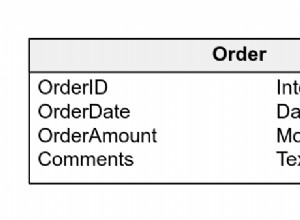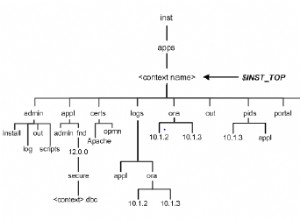voir l'exemple ci-dessous
SELECT mydate calendar_date
,EXTRACT(WEEK FROM mydate) week_num
,EXTRACT(month FROM mydate) month_num
,to_char(mydate,'Mon') month_name
,EXTRACT(Quarter FROM mydate) quarter_num
,EXTRACT(year FROM mydate) calendar_year
,EXTRACT(DOW FROM mydate) iso_dayofweek
,to_char(mydate, 'day') dayofweek_name
FROM (
SELECT now()::DATE mydate
) t
Résultat :
calendar_date week_num month_num month_name quarter_num calendar_year iso_dayofweek dayofweek_name
------------- -------- --------- ---------- ----------- ------------- ------------- --------------
2015/04/24 17 4 Apr 2 2015 5 friday
Vous pouvez utiliser generate_series() pour obtenir toutes les dates d'un an, par exemple :2015
select generate_series(0,364) + date'1/1/2015'
cela produira la date du 1/1/2015 - 31/12/2015 , et utilisez cette select au lieu de SELECT now()::DATE dans l'exemple donné
Si vous souhaitez créer une table pour l'année 2015 alors vous pouvez utiliser la requête suivante
CREATE TABLE mycal_2015 AS
SELECT row_number() OVER () date_key
,mydate calendar_date
,EXTRACT(WEEK FROM mydate) week_num
,EXTRACT(month FROM mydate) month_num
,to_char(mydate,'Mon') month_name
,EXTRACT(Quarter FROM mydate) quarter_num
,EXTRACT(year FROM mydate) calendar_year
,EXTRACT(DOW FROM mydate) iso_dayofweek
,to_char(mydate, 'day') dayofweek_name
FROM (
SELECT generate_series(0, 364) + DATE '1/1/2015' mydate
) t
et le tableau ressemblera à select * from mycal_2015
date_key calendar_date week_num month_num month_name quarter_num calendar_year iso_dayofweek dayofweek_name
-------- ------------- -------- --------- ---------- ----------- ------------- ------------- --------------
1 2015/01/01 1 1 Jan 1 2015 4 thursday
2 2015/01/02 1 1 Jan 1 2015 5 friday
3 2015/01/03 1 1 Jan 1 2015 6 saturday
4 2015/01/04 1 1 Jan 1 2015 0 sunday
5 2015/01/05 2 1 Jan 1 2015 1 monday
6 2015/01/06 2 1 Jan 1 2015 2 tuesday
...
.
.
.
364 2015/12/30 53 12 Dec 4 2015 3 wednesday
365 2015/12/31 53 12 Dec 4 2015 4 thursday
POSTGRESQL :EXTRAIRE LA FONCTION
La fonction d'extraction de PostgreSQL extrait des parties d'une date
Syntaxe :extract( unit from date )
date est une valeur de date, d'horodatage, d'heure ou d'intervalle à partir de laquelle la partie de date doit être extraite.
unité est le type d'unité de l'intervalle tel que jour, mois, minute, heure, etc.
Il peut s'agir de l'un des éléments suivants :
unit description
--------------- -----------------------------------------------------------------------------------------------------------------------------
century Uses the Gregorian calendar where the first century starts at '0001-01-01 00:00:00 AD'
day Day of the month (1 to 31)
decade Year divided by 10
dow Day of the week (0=Sunday, 1=Monday, 2=Tuesday, ... 6=Saturday)
doy Day of the year (1=first day of year, 365/366=last day of the year, depending if it is a leap year)
epoch Number of seconds since '1970-01-01 00:00:00 UTC', if date value. Number of seconds in an interval, if interval value
hour Hour (0 to 23)
isodow Day of the week (1=Monday, 2=Tuesday, 3=Wednesday, ... 7=Sunday)
isoyear ISO 8601 year value (where the year begins on the Monday of the week that contains January 4th)
microseconds Seconds (and fractional seconds) multiplied by 1,000,000
millennium Millennium value
milliseconds Seconds (and fractional seconds) multiplied by 1,000
minute Minute (0 to 59)
month Number for the month (1 to 12), if date value. Number of months (0 to 11), if interval value
quarter Quarter (1 to 4)
second Seconds (and fractional seconds)
timezone Time zone offset from UTC, expressed in seconds
timezone_hour Hour portion of the time zone offset from UTC
timezone_minute Minute portion of the time zone offset from UTC
week Number of the week of the year based on ISO 8601 (where the year begins on the Monday of the week that contains January 4th)
year Year as 4-digits
Remarque :la fonction d'extraction s'applique à PostgreSQL version 8.4 et supérieure
Fonctions et opérateurs de date/heure
generate_series()




